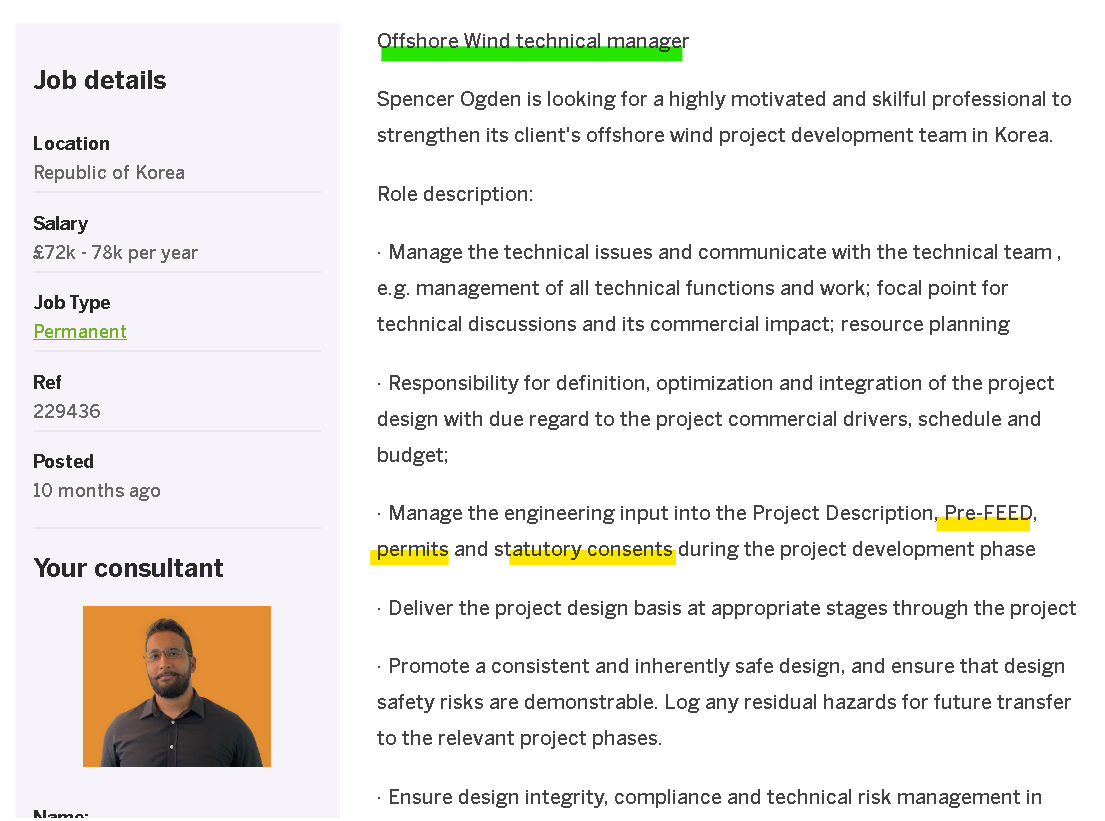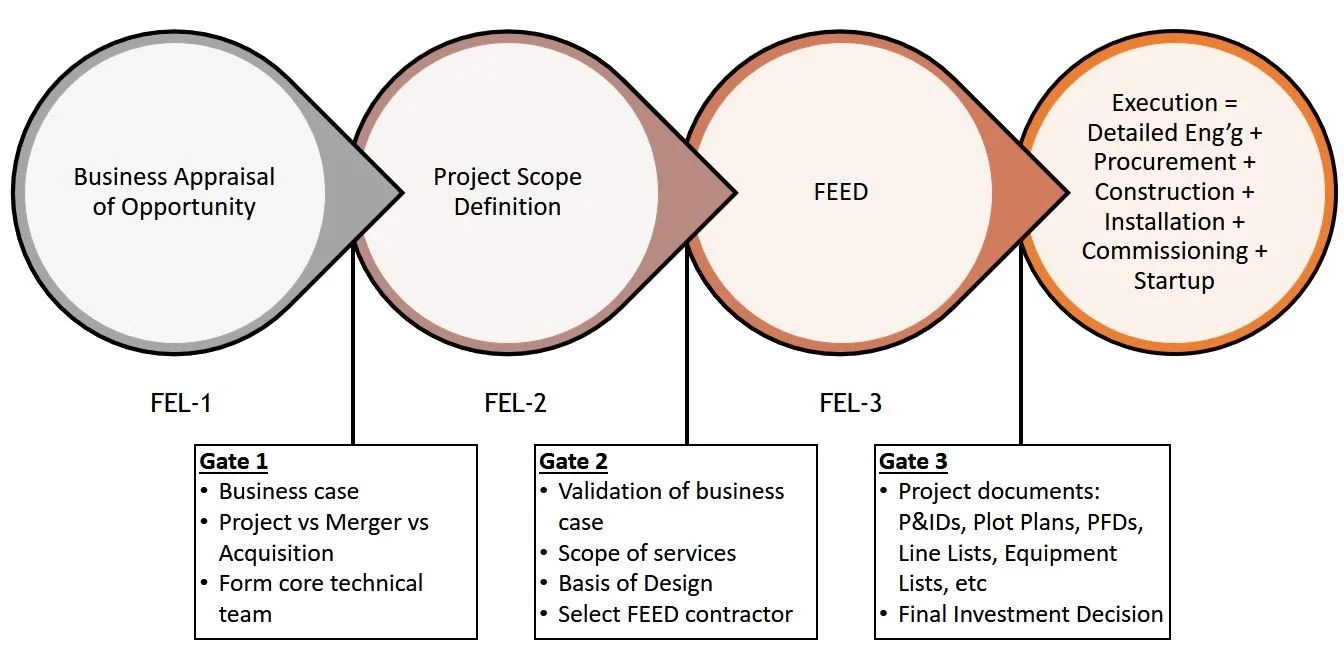Job Shopping for Christmas again…
People rarely associate shopping with jobs, but it’s a hobby of mine.
You could even regard it as a personal creed of mine to explore job opportunities, not for the sake of hopping from one job to another, but rather to discover gaps in my skillset and to stay updated on advancements within the renewable energy sector.
Last time we spoke about CAPEX, OPEX and LCoE, this time, Pre-FEED (Front End Engineering Design) is a common vernacular in the world of project management.
Something I don’t remember learning in Engineering school, but it was mentioned often enough in offshore jobs like the one below, so I think it warrants some attention from prospective project managers who want to aim past the USD 80-100k per annum mark.
Figure 1 An Offshore Wind Technical Manager listed on Spencer Ogden in 2023
Pre-FEED is the initial stage of engineering design for a pipeline project that involves conceptual engineering including feasibility studies, technology selection, process design, equipment specification, cost estimation, project scheduling, and risk management.
The goal of Pre-FEED is to establish the technical and commercial viability of a project, as well as identify potential risks and opportunities.
FEED, on the other hand, is sometimes used synonymously with the word FEL (Front-End Loading), but it is only one of the activities that make up the FEL process and is the last process leading up to the Final Investment Decision for an engineering project.
FEL is all the work done on a project before the final investment decision is made. The FEL process takes different forms in different companies but the underlying principle is the same: the process is divided into stages with each stage ending in a formal assessment aimed at deciding whether to proceed to the next stage, redo/recycle to a past stage, or cancel the project. These assessments cover both the technical and business dimensions of the project. (See Figure 3)
Figure 3 Example of a Business Plan Schedule for a Large Process Plant Project
Figure 4 Each stage of the project has gatekeeping matrix
In a proper FEL process, there must be a minimum of 3 stages:
FEL-0~FEL-2: Pre-FEED stages
FEL-3 : FEED Stage
For a new or unfamiliar business or locale, companies will need this stage to familiarise themselves with the new business or locale sufficiently before the formal appraisal of the opportunity is embarked upon.
This stage is to appraise the business opportunity and come up with a convincing business case. The process also includes the activities to determine the optimum philosophy for achieving the business objectives: building a new project vs acquisition vs mergers/partnership/joint venture or any combination of the aforementioned.
Also known as the Assess, Business Planning, Ballpark, Rough Order of Magnitude Stage.
All business issues of the project are finalised here. With all the details fleshed out by the scope definition process, it should be clear whether or not the economics of the project support the project.
No project should progress to FEL-3 from FEL-2 if questions remain about the validity of the business case.
TWO main documents are created at this stage:
- Scope of Work (SOW)
- Engineering Basis of Design (BOD)
Also known as the Select, Pre-FEED, Preliminary, Pre-design Stage.
At this stage, the project team finds a contractor/consultant and draws a scope of services that contractors can bid for to carry out the FEED.
Companies rarely ever cancel a project after FEED. This is because FEED is expensive. Depending on several factors, the cost of FEED could be anywhere between 0.5% and 4% of the overall project execution cost.
For a big project, say, a $2 billion project, the cost is around $10 million(0.5%) – $80 million(4%). For many companies, this is a lot of money and managers would have a difficult time explaining why a project should be cancelled after such an amount has been spent already.
In FEL-3, the scope should be finalised, the contracting strategy frozen and the bid package delivered. The goal of this stage is to produce a total installed project cost estimate that is +/- 10-15% accurate.
Regardless of how much the costs are upon completion of FEED, a full assessment of the FEED itself plus all the preceding stages will enable the project owner and the stakeholders to decide whether to authorise funds for the project.
Going beyond FEED with errors in your business case, scope study or FEED could be calamitous for a project and a business.
Project cancellation during execution occurs solely due to significant omissions or errors occurring in one or multiple stages preceding full authorization of funds for the project.
However, sometimes, cancellation to start afresh is the only way to avoid astronomical cost growth and schedule slippage which invariably go hand-in-hand with severely limited operability once the project is completed and operations commence
Also known as the Design, Budget, and Basic Engineering Stage.
Conclusion
From the project owner's perspective, all elements leading up to the completion of FEED (Basic Engineering) should be regarded as integral to project initiation and planning. However, once the detailed engineering and procurement phases begin, focus should shift towards ensuring the successful execution of the project.
FEL-2 holds paramount importance within the FEL process, serving as the stage where business requirements must be seamlessly translated into technical specifications.
At the transition gate from FEL-2 to FEL-3, all business inquiries should be addressed, while technical queries regarding the project's scope about scope should be fully defined in the scope of services and basis of design in preparation for FEED, FEL-3.
Further reading:
Schedule Optimization During Front-End Planning



